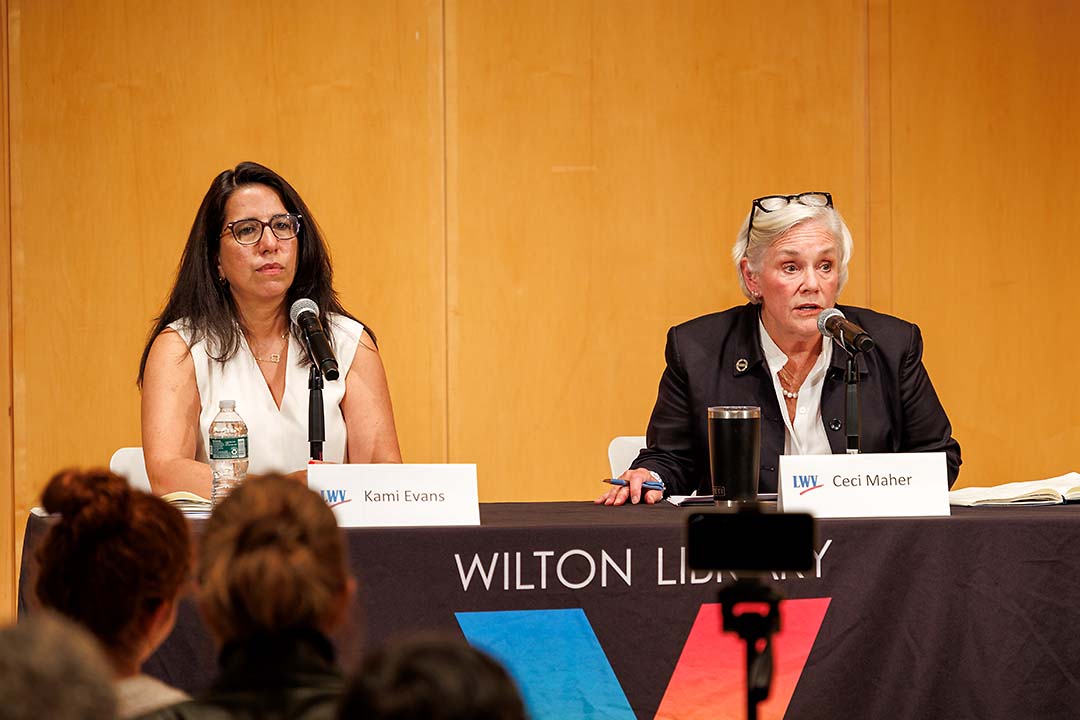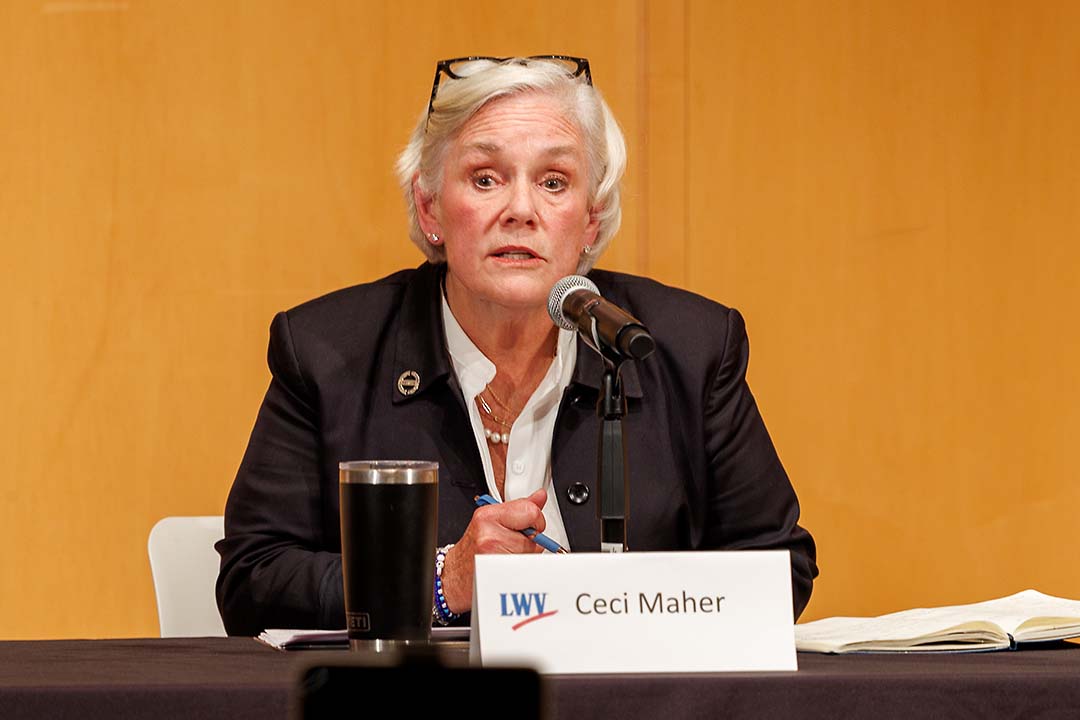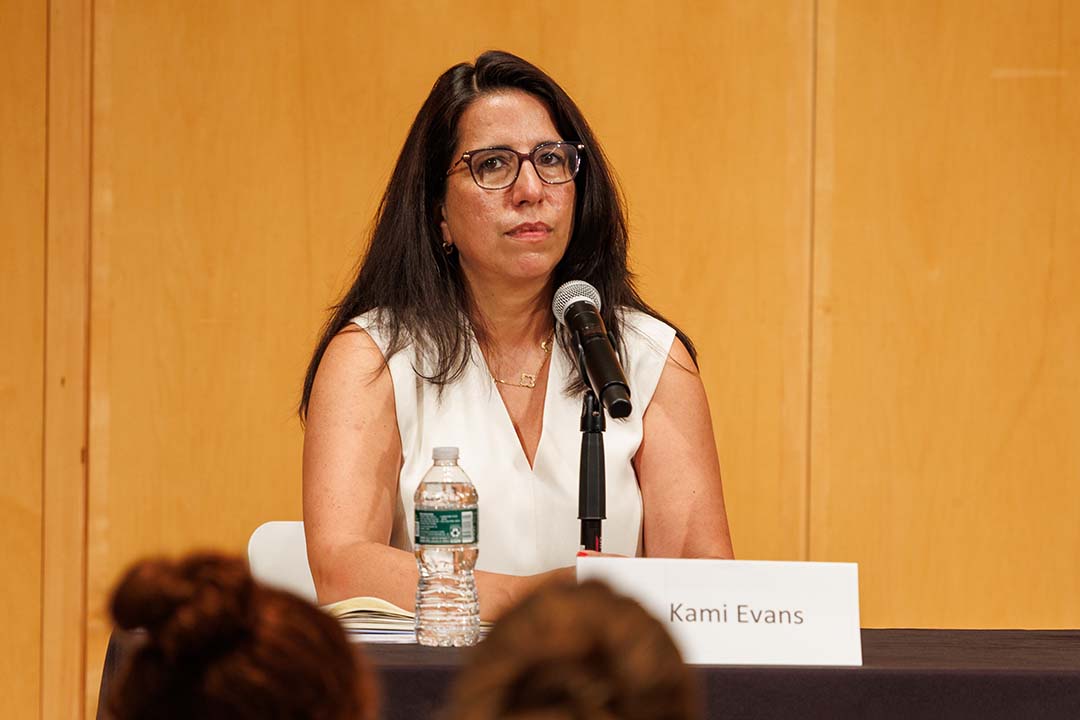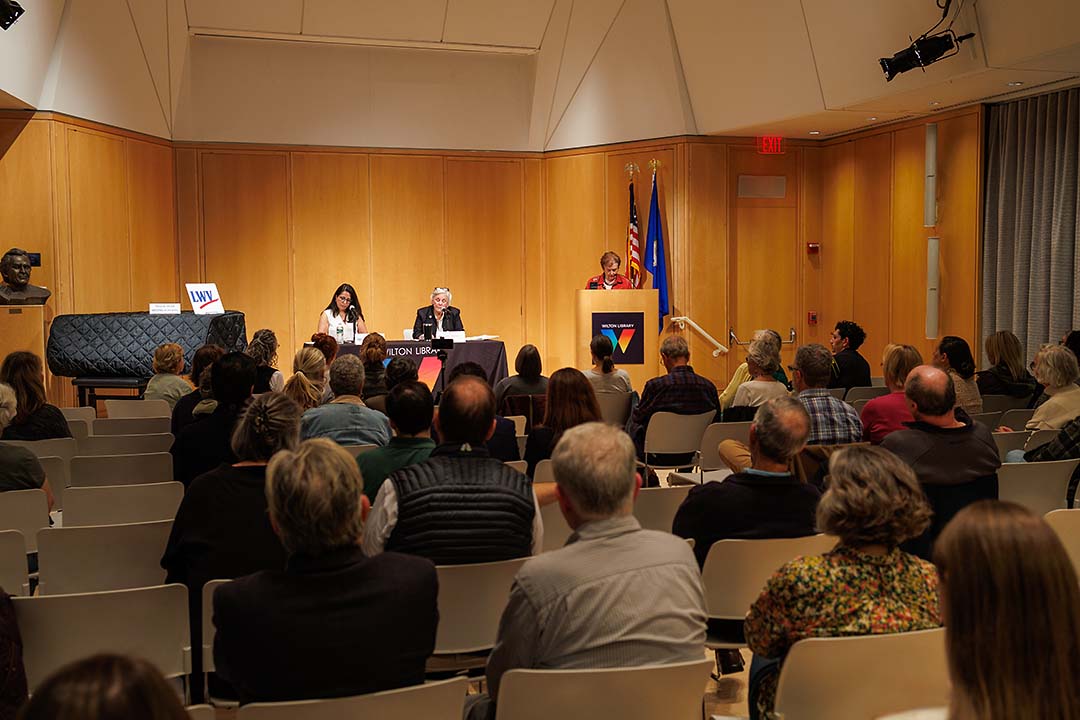State Senate Candidates Debate

Weston Today photos
State Senator Ceci Maher and her challenger, Kami Evans, debated on October 8 in a Wilton League of Women Voters event at the Wilton Library.
Senator Maher, a Democrat, seeks reelection to the State Senate representing the 26th district, which encompasses Weston, Westport, Wilton, Redding, and parts of Ridgefield, Darien, New Canaan, and Stamford. Ms. Evans, nominated by the Republican and Independent parties, is making her first bid for elective office.
The debate opened with a question asking each candidate what would be the first bill they would introduce if elected.
Ms. Evans said there was a need to focus on veterans. “Anything we can do to bring veterans to the table, I’m all about,” she said.
Senator Maher said one bill she will propose has already been vetted by the Office of Legislative Research and negotiated with the Judiciary committee, a measure to establish mediation “so children are not hurt at family court and in divorce proceedings.” She also wants to look into providing silent alarms for school security and reducing the limit on gun purchases from 36 per year to 12.

Asked how to address the need for affordable housing, Senator Maher said there is “a housing crisis” that hinders economic growth and burdens taxpayers. She said the state should provide incentives to increase inventory, and that Statute 8-30g somehow became “the holy grail” instead of a focus on housing for workers and seniors. “We need to put more housing in place,” she said.

Ms. Evans said “it has been horrible” being a single mom with two daughters once living in a multi-bedroom multi-bathroom house and now in 850 square feet. She said “we need to get housing for people trying to be pediatricians” because in order to afford living in this state they “have to become psychiatrists as well as pediatricians.”
Absentees, local control, collaboration
The candidates disagreed about the proposed amendment to the State Constitution to allow no-excuse absentee voting. Senator Maher is for it, Ms. Evans is against.
The candidates both expressed support for local control of zoning and education. “I would rather fish than give a fish,” said Ms. Evans.
Senator Maher said her support for local control is “100 percent,” and that she also believes in “working in concert with Hartford” so that the overall needs of the state are not overlooked. She noted that, in the legislature, Republicans and Democrats work collaboratively. “It’s not like Washington D.C.,” she said.
In response, Ms. Evans said she had been put “in the naughty corner” and not allowed to participate in a panel organized by Senator Maher and the State Comptroller on mental health for children. “That was a beautiful opportunity to bring me into the fold and learn what I could offer,” she said.
Senator Maher said the session was not a public hearing, but an expert roundtable with state officials to hear from invited pediatric doctors about children’s mental health matters they encounter in their practices.
Pressing issues, taxes, regulations
Next, the candidates were asked about the issues they believe are most pressing for towns in the district. Senator Maher said the top ones are housing and food insecurity. She cited a recently released report that over 40 percent of Connecticut residents earn less than what they need to survive in the state.
For Ms. Evans, “everything links up to mental health,” she said. “A lot of people are having a struggle, young men especially are taking their lives because they don’t see hope.”
The candidates were asked about ideas to reduce taxes and regulatory burdens on small businesses. “This is my first time running,” said Ms. Evans, who then read from a list of items that included retaining the state’s fiscal guardrails, a $2,000 child tax credit, exempting Social Security income from state taxes, eliminating the highway use tax, and reducing the employee contribution to the paid family leave fund.
Senator Maher said much of her work involves attracting business to Connecticut and bringing state funds to towns in the district. She said small business owners are pleased that the legislature eliminated the business entity tax. She is enthusiastic about state funding to rehabilitate the Gilbert & Bennett wire mill, calling it a place with “tremendous opportunity” for small businesses. She said she is working with the Secretary of the State to streamline regulations and with the insurance commissioner to reduce rates.
Ms. Evans added that her “main role is community engagement” and that she manages or supports over 60 social media platforms. She said she wants to expand on that role to link municipalities and nonprofits to businesses that have a new product or service to promote. “It’s imperative that everyone knows about it,” she said.
Ms. Maher added that when she led organizations like Person To Person and Sandy Hook Promise she had to deal with all aspects of running a small business. “I know what it’s like when something is passed in Hartford and I have to think about how to make it work.” She said that, as a senator, she has worked to raise the profile of local businesses and nonprofits.
Ms. Evans complained that when Ms. Maher ran Person To Person she declined an offer by Ms. Evans to raise funds. Ms. Evans said it was “a hurtful moment.” Ms. Maher said she had no memory of that.
Dobbs, climate change
The next question was whether the candidates agreed with the Supreme Court Dobbs ruling, which overturned Roe v. Wade. Senator Maher said she did not. “I firmly believe that everyone has the right to make their own decisions about their reproductive rights.”
Ms. Evans did not answer the question, saying “this is a tricky one for me.” She said she had children late in life “by God’s grace,” years after losing a child conceived from an assault. Ms. Maher said she was “truly sorry” Ms. Evans had that experience, and added that she is concerned that some want to ban in vitro fertilization.
Asked what the state could do about climate change, Ms. Evans said her family has been in the recycling business. She said there is a need to support “better living” but “not do so much doom and gloom on our kids.”
Senator Maher said two climate bills in the last legislative session did not pass. She said one bill was aimed at working with towns to mitigate flood damage on roads and in waterways. She said there are “many ways we need to address climate,” including reducing emissions and vegetative waste. She said she would work in the Senate to leave children “with the same Connecticut we enjoy now.”
Utilities
The next question was about electricity rates. Senator Maher said the problem relates to climate change. “We have got to go to solar and wind,” she said, adding that it would require significant investment. She also said “we must address Eversource,” and that a consumer advocate needed to be seated on the Public Utilities Regulatory Authority (PURA).
Ms. Evans said the public benefit portion of utility bills is unfair, and that “we are so consumed with Eversource we’re not keeping our eye on the sale of Aquarion.” She claimed the sale would increase water bills and public debt.
In this year’s short session, the legislature voted to allow the South Central Connecticut Regional Water Authority (RWA) to possibly acquire Aquarion, the water company Eversource currently owns but wants to divest. No deal has yet been made, and PURA would have to approve a takeover after holding public hearings.
Senator Maher explained that the legislature had “smoothed the path” to the possible acquisition to “make sure the water stays safe and under Connecticut control.” If the purchase takes place, she said, representatives from affected towns would make sure “the pricing and ways in which the water is used is in our best benefit.”
Closing
In closing, Ms. Evans recounted her community engagement, said she had raised more than $3 million for nonprofits, and that her ADHD is “my superpower that helped me spot trends and create opportunities.” She added that she had run a yoga program in New York City for at-risk and special needs children and one for nonverbal adults about the benefits of yoga. “Education is at the heart of everything I do,” she said.
Senator Maher recapped her work as chair of the legislature’s Children’s Committee and her service on the Judiciary, Human Services, and Energy and Technology committees. She said “one of her favorite things” has been bringing to the district state grants totaling more than $10 million to address long-unmet needs. But above all, she said, “I like helping constituents.”

